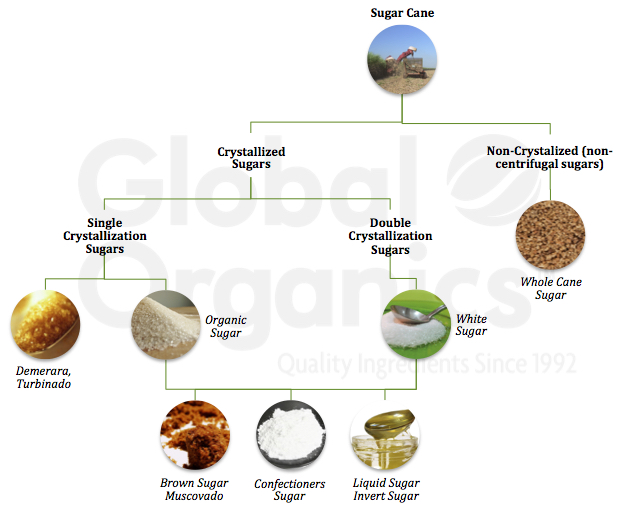The Role of Sugar and Cane in Creating Flavored Syrups and Sweeteners
The Role of Sugar and Cane in Creating Flavored Syrups and Sweeteners
Blog Article
Why Cane Sugar Handling Chemicals Are Vital for Modern Sugar Refining
The duty of walking stick sugar processing chemicals in modern-day sugar refining can not be overstated, as they are indispensable to enhancing both the performance of extraction and the total high quality of the final item. Representatives such as phosphoric acid and certain flocculants are employed to remove contaminations, resulting in sugar that not just satisfies consumer assumptions yet also adheres to market standards.
Function of Processing Chemicals
The efficacy of cane sugar processing pivots dramatically on the critical application of processing chemicals. These chemicals play an essential function in improving the efficiency and quality of sugar removal and refining. From the initial stages of juice extraction to the last purification steps, handling chemicals help with various essential operations.
In the removal phase, chemicals such as phosphoric acid and calcium hydroxide are used to enhance the information process, aiding to eliminate impurities and suspended solids from the walking cane juice. This not only boosts the return but additionally ensures the clearness of the end product. In addition, representatives like flocculants aid in the rapid settling of contaminations, thus enhancing the general procedure.
Activated carbon and ion exchange materials offer to get rid of color and odor, guaranteeing that the refined sugar fulfills customer high quality criteria. Therefore, the precise selection and application of these chemicals are crucial for achieving optimum outcomes in cane sugar handling.
Trick Kinds Of Chemicals
Cane sugar handling depends on a variety of vital chemicals that facilitate each stage of manufacturing. These chemicals play crucial roles in making clear, bleaching, and cleansing the sugar extracted from cane.
One main group of chemicals consists of flocculants, such as polyacrylamide, which help in the clarification process by promoting the aggregation and settling of impurities. Additionally, calcium hydroxide is frequently employed to neutralize acidity and assist in the removal of non-sugar components.
Whitening agents, such as activated carbon and sulfur dioxide, are utilized to decolorize the syrup, resulting in a clearer end product. These chemicals assist remove color compounds that might impact the sugar's appearance and marketability.
Additionally, phosphoric acid functions as a pH regulator during the processing phases, guaranteeing ideal problems for the enzymatic tasks associated with sugar extraction and filtration.
Various other essential agents include edta (ethylenediaminetetraacetic acid), which chelates metal ions that can catalyze undesirable reactions, and sodium hydroxide, which aids in pH control throughout the refining procedure. Jointly, these chemicals boost effectiveness and ensure a premium cane sugar item.
Advantages for Sugar Top Quality
Frequently ignored, the usage of details processing chemicals substantially improves the overall high quality of cane sugar. These chemicals play a pivotal role in refining procedures, making sure that the end product satisfies strict market standards for purity and preference.

In addition, processing chemicals aid in accomplishing a consistent granulation and appearance, which are crucial for customer approval. By managing the condensation procedure, these chemicals make certain that the sugar crystals develop uniformly, causing an extra attractive product that liquifies well in numerous applications.
Additionally, using these chemicals can boost the life span of walking cane sugar by decreasing wetness absorption and microbial growth. Generally, the strategic application of processing chemicals is important for providing top notch cane sugar that fulfills customer expectations and market needs.
Ecological Impact Considerations

Additionally, the energy-intensive nature of sugar refining, worsened by chemical use, frequently results in boosted carbon exhausts. This adds to climate modification and raises worries concerning the sustainability of current refining techniques. Furthermore, the sourcing of these chemicals might entail practices that threaten biodiversity, such as monoculture farming, which reduces the strength of farming ecosystems.

To minimize these influences, sugar refiners are increasingly exploring lasting options and taking on ideal techniques that lessen chemical usage. Executing strenuous ecological management systems can aid make certain that the refining process aligns with environmental standards and advertises biodiversity. Eventually, a balanced method that focuses on both sugar high quality and environmental stewardship is crucial for the long-term viability of the sugar sector.
Future Trends in Refining
As the sugar sector grapples with the ecological difficulties connected with traditional refining methods, innovative methods are emerging to redirected here improve both efficiency and sustainability. One considerable trend is the fostering of environment-friendly chemistry concepts, which prioritize the usage of non-toxic, biodegradable processing chemicals. This shift not only lessens ecological influence however also addresses consumer demand for cleaner production techniques.
One more encouraging advancement is the application of advanced filtering modern technologies, such as membrane layer separation and adsorption procedures. These methods improve the clearness and top quality of the sugar Homepage while decreasing the quantity of wastewater created throughout refining. In addition, the integration of electronic technologies, including IoT and AI, is transforming functional efficiency by making it possible for real-time tracking and anticipating upkeep, thus decreasing resource waste.
In addition, the usage of by-products from sugar refining, such as bagasse and molasses, is gaining traction. These products can be exchanged biofuels or value-added products, adding to a round economy within the sector. Collectively, these fads indicate a shift towards more lasting techniques that not only enhance functional effectiveness but likewise align with global sustainability objectives, guaranteeing the future viability of sugar refining.
Verdict
Walking stick sugar processing chemicals are necessary in modern sugar refining, dramatically boosting the performance and quality of sugar removal. The critical use of these chemicals not only improves the purity and taste of the last item yet additionally guarantees regular formation and structure. As the market progressively focuses on sustainability, the adoption of environmentally-friendly handling agents is most likely to shape future patterns in refining, ultimately leading to better items and extended life span for consumers.

Inevitably, a well balanced method that prioritizes both sugar top quality and environmental stewardship is necessary for the long-lasting practicality of the sugar sector.
Cane sugar handling chemicals are necessary in contemporary sugar refining, considerably boosting the effectiveness and quality of sugar removal.
Report this page